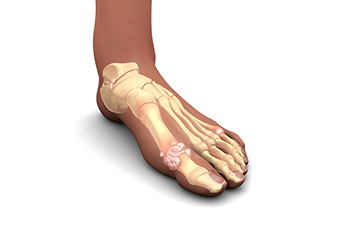
Managing gout attacks involves a combination of lifestyle changes and medical treatments to reduce uric acid levels and prevent flare-ups. Gout, once known as a disease of kings due to its association with rich foods and alcohol, is now widespread, affecting over eight million US adults. The rise in cases is also linked to obesity and high blood pressure. Gout is caused by uric acid crystals in the joints, leading to intense pain, redness and swelling, commonly in the big toe. Prevention strategies include losing weight, avoiding alcohol and high-purine foods like red meat and seafood, and incorporating low-fat dairy into your diet. Medications to lower uric acid levels are often necessary and regular use of them can significantly reduce the frequency and severity of gout attacks. These measures can improve the quality of life and prevent long-term joint damage. If you have symptoms of gout, it is suggested that you schedule an appointment with a podiatrist for help in managing it effectively.
Gout is a painful condition that can be treated. If you are seeking treatment, contact Tanisha Richmond, DPM from Richmond Foot & Ankle, LLC. Our doctor will treat your foot and ankle needs.
What Is Gout?
Gout is a form of arthritis that is characterized by sudden, severe attacks of pain, redness, and tenderness in the joints. The condition usually affects the joint at the base of the big toe. A gout attack can occur at any random time, such as the middle of the night while you are asleep.
Symptoms
- Intense Joint Pain - Usually around the large joint of your big toe, and it most severe within the first four to twelve hours
- Lingering Discomfort - Joint discomfort may last from a few days to a few weeks
- Inflammation and Redness -Affected joints may become swollen, tender, warm and red
- Limited Range of Motion - May experience a decrease in joint mobility
Risk Factors
- Genetics - If family members have gout, you’re more likely to have it
- Medications - Diuretic medications can raise uric acid levels
- Gender/Age - Gout is more common in men until the age of 60. It is believed that estrogen protects women until that point
- Diet - Eating red meat and shellfish increases your risk
- Alcohol - Having more than two alcoholic drinks per day increases your risk
- Obesity - Obese people are at a higher risk for gout
Prior to visiting your podiatrist to receive treatment for gout, there are a few things you should do beforehand. If you have gout you should write down your symptoms--including when they started and how often you experience them, important medical information you may have, and any questions you may have. Writing down these three things will help your podiatrist in assessing your specific situation so that he or she may provide the best route of treatment for you.
If you have any questions, please feel free to contact our office located in Dayton, OH . We offer the newest diagnostic and treatment technologies for all your foot care needs.